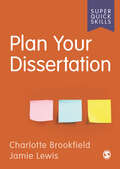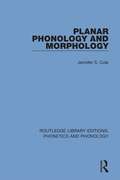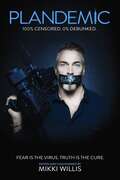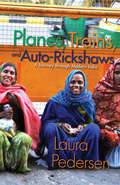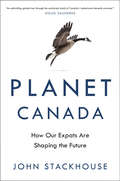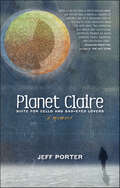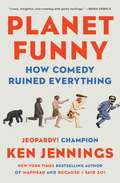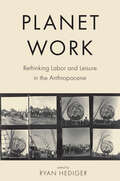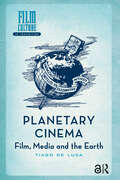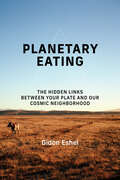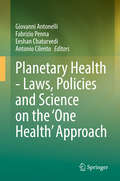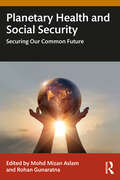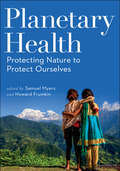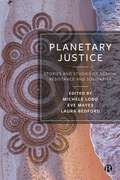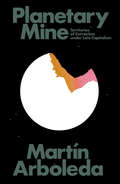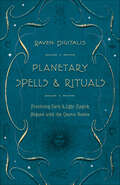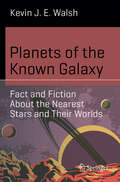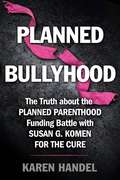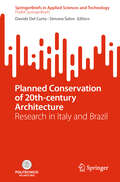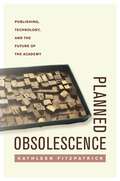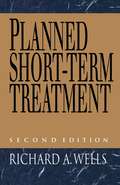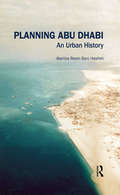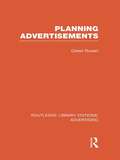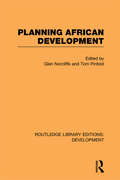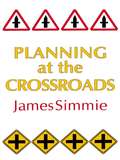- Table View
- List View
Plan Your Dissertation (Super Quick Skills)
by Jamie Lewis Charlotte BrookfieldPlanning your dissertation is made simple with this quick, step-by-step guide. Your instant pocket supervisor, this book will help you to: · Choose a topic you are excited about · Manage your time and beat procrastination · Create a step-by-step plan to keep you on track. Super Quick Skills provides the essential building blocks you need to succeed at university - fast. Packed with practical, positive advice on core academic and life skills, you’ll discover focused tips and strategies to use straight away. Whether it’s writing great essays, understanding referencing or managing your wellbeing, find out how to build good habits and progress your skills throughout your studies. Learn core skills quickly Apply them right away and see results Succeed in your studies and in life Super Quick Skills gives you the foundations you need to confidently navigate the ups and downs of university life.
Planar Phonology and Morphology (Routledge Library Editions: Phonetics and Phonology #3)
by Jennifer S. ColeFirst published in 1991. In this study, the author investigates the proper treatment of harmony processes in phonological theory. The data examined lead to a formulation of morphologically governed harmony processes which involves multi-planar representations. The analysis of multi-planar harmony leads into a discussion of Plane Conflation and Bracket Erasure in Lexical Phonology. This title will be of great interest to students of linguistics.
Plandemic: Fear Is the Virus. Truth Is the Cure.
by Mikki WillisThe incredible true story of the most banned documentary in history. Researching the controversy arising after the release of the viral phenomenon known as Plandemic, the most seen and censored documentary in history, an investigative journalist sets out to disprove and debunk claims made throughout the film. Instead, the journalist opens a Pandora&’s box to witness firsthand an underworld of corruption, lies, and the darkest of unsolved mysteries. The result? A fascinating behind-the-scenes account about the making of Plandemic and Plandemic: Indoctornation; an exposé of the truth behind the origins of COVID-19; an alarming examination of individuals, such as Dr. Anthony Fauci and Bill Gates, and organizations like the CDC, NIH, WHO, and Bill & Melinda Gates Foundation, among others, driving the global vaccination agenda; and a look at the tech giant and mainstream media forces doing their utmost to silence and suppress the veracity of these findings. Investigative filmmaker Mikki Willis focuses his unflinching lens on two key subjects: virologist Dr. Judy Mikovits, who speaks frankly about the machinations for control and profit corrupting individuals and institutions tasked with overseeing public health; and Dr. David E. Martin, whose research and shocking data corroborate allegations of conflicts of interest. The US media and fact checkers condemned the two documentaries as &“dangerous conspiracy theory.&” Today, the two-part bombshell is being hailed globally for warning the world of the crimes against humanity that are just now being uncovered. From the death of his brother and mother due to bad medicine, to his awakening at Ground Zero on 9/11, Mikki Willis describes in detail the incredible life experiences that led him to risk his career and safety to create the Plandemic series.
Planes, Trains, and Auto-Rickshaws
by Laura Pedersen"It is Pedersen's gift to be able to draw the reader into her world." --Front Street Reviews "[Pedersen's] wicked, sarcastic, dry, self-deprecating sense of humor won me over and I absolutely loved it start to finish."--Printed Page, of Buffalo Gal India today is a nation caught between the rich heritage of its past and the great economic potential of its future. In this witty and insightful book, journalist and author Laura Pedersen reveals the tensions and contradictions facing the emerging world power. In particular, Pedersen explores the roles of women and children in India today, providing insight into this important and often neglected issue. Part travelogue, part history, and part cultural reflection, Planes, Trains, and Auto-Rickshaws provides an intimate glimpse of a nation at its turning point. It is a must-read for those who want to understand India beyond the headlines. Laura Pedersen has written for The New York Times and is the author of several books including Play Money, Going Away Party, Beginner's Luck (chosen as a Barnes & Noble Discover Great New Writers selection), Buffalo Gal, and Buffalo Unbound. In 1994 President Clinton honored her as one of Ten Outstanding Young Americans. She has appeared on Oprah, Good Morning America, Primetime Live, and The Late Show with David Letterman, and she writes for several well-known comedians. Pedersen lives in New York City.
Planet Canada: How Our Expats Are Shaping the Future
by John StackhouseA leading thinker on Canada's place in the world contends that our country's greatest untapped resource may bethe three million Canadians who don't live here.Entrepreneurs, educators, humanitarians: an entire province's worth of Canadian citizens live outside Canada. Some will return, others won't. But what they all share is the ability, and often the desire, to export Canadian values to a world sorely in need of them. And to act as ambassadors for Canada in industries and societies where diplomatic efforts find little traction. Surely a country with people as diverse as Canada's ought to plug itself into every corner of the globe. We don't, and sometimes not even when our expats are eager to help.Failing to put this desire to work, contends bestselling author and longtime foreign correspondent John Stackhouse, is a grave error for a small country whose voice is getting lost behind developing nations of rapidly increasing influence. The soft power we once boasted is getting softer, but we have an unparalleled resource, if we choose to use it. To ensure Canada's place in the world, Stackhouse argues in Planet Canada, we need this exceptional province of expats and their special claim on the twenty-first century.
Planet Claire, Suite for Cello and Sad-Eyed Lovers: A Memoir
by Jeff PorterThe second installment in Ann Hood’s Gracie Belle imprint challenges the traditional solemnity that characterizes nonfiction books of grief, loss, and sorrow.“Few readers will fail to be gripped by this tragically common story about death and what comes after for those left behind . . . A haunting and thought-provoking consideration of death and ‘how utterly it rips apart our lives.'” —Kirkus Reviews, Starred ReviewPlanet Claire is the story of the untimely death of the author’s wife and his candid account of the following year of madness and grief. As his life unravels, Porter analyzes his sadness with growing interest. He talks to Claire as if to evoke a presence, to mark a space for memory. He reports on his daily walks and shares observations of life’s sadness, while reminiscing about various moments in their life together. Like Orpheus, the author searches for a lost love, and what he finds is not the dog of doom but flashes of an intimate symmetry that brighten the darkest places of sorrow.The second title from Ann Hood’s Gracie Belle imprint, Planet Claire takes readers on a journey of sorrow that recalls memorable works by C.S. Lewis (A Grief Observed), Joan Didion (The Year of Magical Thinking), and Julian Barnes (Levels of Life). Porter’s memoir, however, is also playful, quirky, and self-ironic in a way that challenges the genre’s traditional solemnity. Like the novel Grief Is the Thing with Feathers by Max Porter, this is an unpredictably funny account of heartbreak, as if to say there’s something about the magnitude of loss that troubles even earnestness.
Planet Funny: How Comedy Took Over Our Culture
by Ken JenningsA Kirkus Reviews Best Book of the Year The witty and exuberant New York Times bestselling author and record-setting Jeopardy! champion Ken Jennings relays the history of humor in &“lively, insightful, and crawling with goofy factlings,&” (Maria Semple, author of Where&’d You Go Bernadette)—from fart jokes on clay Sumerian tablets to the latest Twitter gags and Facebook memes.Where once society&’s most coveted trait might have been strength or intelligence or honor, today, in a clear sign of evolution sliding off the trails, it is being funny. Yes, funniness. Consider: Super Bowl commercials don&’t try to sell you anymore; they try to make you laugh. Airline safety tutorials—those terrifying laminated cards about the possibilities of fire, explosion, depressurization, and drowning—have been replaced by joke-filled videos with multimillion-dollar budgets and dance routines. Thanks to social media, we now have a whole Twitterverse of amateur comedians riffing around the world at all hours of the day—and many of them even get popular enough online to go pro and take over TV. In his &“smartly structured, soundly argued, and yes—pretty darn funny&” (Booklist, starred review) Planet Funny, Ken Jennings explores this brave new comedic world and what it means—or doesn&’t—to be funny in it now. Tracing the evolution of humor from the caveman days to the bawdy middle-class antics of Chaucer to Monty Python&’s game-changing silliness to the fast-paced meta-humor of The Simpsons, Jennings explains how we built our humor-saturated modern age, where lots of us get our news from comedy shows and a comic figure can even be elected President of the United States purely on showmanship. &“Fascinating, entertaining and—I&’m being dead serious here—important&” (A.J. Jacobs, author of The Year of Living Biblically), Planet Funny is a full taxonomy of what spawned and defines the modern sense of humor.
Planet Work: Rethinking Labor and Leisure in the Anthropocene
by James Armstrong Jennifer K. Ladino Amanda Adams Ted Geier Sharon O'Dair Ryan Hediger David Rodland Sinan Akilli Daniel Clausen Matt Wanat Will Elliot Kevin Maier Jo ReyLabor and labor norms orient much of contemporary life, organizing our days and years and driving planetary environmental change. Yet, labor, as a foundational set of values and practices, has not been sufficiently interrogated in the context of the environmental humanities for its profound role in climate change and other crises. This collection of essays demonstrates the urgent need to rethink models and customs of labor and leisure in the Anthropocene. Recognizing the grave traumas and hazards plaguing planet Earth, contributors expose fundamental flaws in ideas of work and search for ways to redirect cultures toward more sustainable modes of life. These essays evaluate Anthropocene frames of interpretation, dramatize problems and potentials in regimes of labor, and explore leisure practices such as walking and storytelling as modes of recasting life, while a coda advocates reviving notions of work as craft.
Planetary Cinema: Film, Media and the Earth (Film Culture in Transition)
by Tiago LucaThe story is now familiar. In the late 1960s humanity finally saw photographic evidence of the Earth in space for the first time. According to this narrative, the impact of such images in the consolidation of a planetary consciousness is yet to be matched. This book tells a different story. It argues that this narrative has failed to account for the vertiginous global imagination underpinning the media and film culture of the late nineteenth century and beyond. Panoramas, giant globes, world exhibitions, photography and stereography: all promoted and hinged on the idea of a world made whole and newly visible. When it emerged, cinema did not simply contribute to this effervescent globalism so much as become its most significant and enduring manifestation. Planetary Cinema proposes that an exploration of that media culture can help us understand contemporary planetary imaginaries in times of environmental collapse. Engaging with a variety of media, genres and texts, the book sits at the intersection of film/media history and theory/ philosophy, and it claims that we need this combined approach and expansive textual focus in order to understand the way we see the world.
Planetary Eating: The Hidden Links between Your Plate and Our Cosmic Neighborhood
by Gidon EshelA scientifically rigorous guide to making the best dietary choices for both our personal health and our environmental footprint.Many of us try our best to eat foods that are healthy and environmentally sustainable. But are we getting it right? Which foods amount to &“wise&” choices, and which ones are best avoided? Common views often range widely and are sometimes even contradictory. It&’s most unfortunate when conscientious individuals who go to great lengths in their quest to minimize environmental impacts follow the wrong advice. In Planetary Eating, Gidon Eshel aims to minimize such misuse of good will by providing scientifically untrained readers with the tools needed to make the best choices for themselves and for our planet.Eshel writes that dietary choices, and the corresponding agricultural patterns, are, for most of us, our principal form of planetary agency—the main ways by which we impact our overburdened and undernourished host planet. Agriculture and diet are therefore most productively examined through the planetary science perspective. Starting from rather basic (but not quite first) principles, Planetary Eating offers impartial, fact-based analysis with firm foundations in earth and planetary sciences on how to make the right dietary choices.
Planetary Health - Laws, Policies and Science on the 'One Health' Approach
by Giovanni Antonelli Fabrizio Penna Eeshan Chaturvedi Antonio CilentoThis book offers a multidisciplinary and in-depth analysis of the One Health approach. The holistic One Health vision, a healthcare model based on the integration of various disciplines, is both ancient and current. It is based on the recognition that human health, animal health and ecosystem health are inextricably linked. Cognizant of the need for multidisciplinary research to address complex health challenges at the national and international level, the book combines legal, public policy and medical perspectives on the One Health approach, exploring e.g. the role of biodiversity, human rights, trade agreements, indigenous knowledge, and climate change mitigation and adaptation. One Health is officially recognized by the European Commission and by a host of international organizations as a relevant strategy for actors in all sectors that benefit from collaboration between disciplines (doctors, veterinarians, lawyers, environmentalists, economists, sociologists etc.). One Health is an ideal approach to achieving global health, as it addresses the needs of the most vulnerable populations based on the intimate relationship between their own health, that of their animals, and that of the environment in which they live, considering the wide spectrum of determinants that emerge from this relationship. Given its scope, the book will be of interest to academics, professionals, and students of all disciplines who engage with the One Health approach.
Planetary Health and Social Security: Securing Our Common Future
by Rohan GunaratnaOffering an in-depth exploration of the security challenges posed by COVID-19, Gunaratna, Aslam, and their contributors present a comprehensive collection of thematic and country-specific analyses on post-pandemic planetary health strategies. This book critically evaluates the global challenges and responses to COVID-19, examining its impact across key sectors such as security, defense, trade, health, economy, and religion. Through empirical evidence and diverse case studies, it analyzes the strengths and shortcomings of international efforts and offers thoughtful approaches and solutions to fostering a balanced and resilient planet for future generations. Essential for students and scholars of planetary health, international relations, humanitarian affairs, strategic and defense management, policy studies, and global health, this book also serves as a valuable resource for policymakers, government ministries, and agencies seeking insights into effective global practices.
Planetary Health: Protecting Nature to Protect Ourselves
by Howard Frumkin Samuel MyersHuman health depends on the health of the planet. Earth's natural systems—the air, the water, the biodiversity, the climate—are our life support systems. Yet climate change, biodiversity loss, scarcity of land and freshwater, pollution and other threats are degrading these systems. The emerging field of planetary health aims to understand how these changes threaten our health and how to protect ourselves and the rest of the biosphere.Planetary Health: Protecting Nature to Protect Ourselves provides a readable introduction to this new paradigm. With an interdisciplinary approach, the book addresses a wide range of health impacts felt in the Anthropocene, including food and nutrition, infectious disease, non-communicable disease, dislocation and conflict, and mental health. It also presents strategies to combat environmental changes and its ill-effects, such as controlling toxic exposures, investing in clean energy, improving urban design, and more. Chapters are authored by widely recognized experts.The result is a comprehensive and optimistic overview of a growing field that is being adopted by researchers and universities around the world. Students of public health will gain a solid grounding in the new challenges their profession must confront, while those in the environmental sciences, agriculture, the design professions, and other fields will become familiar with the human consequences of planetary changes. Understanding how our changing environment affects our health is increasingly critical to a variety of disciplines and professions. Planetary Health is the definitive guide to this vital field.
Planetary Justice: Stories and Studies of Action, Resistance and Solidarity
by Michele LoboAvailable open access digitally under CC-BY-NC-ND licence. Bringing together interdisciplinary climate change scholarship and grassroots activism, this book considers the possibilities of planetary justice across human difference, generations, species and the concept of life and non-life. Writing amidst bushfires, cyclones, global climate strikes and a global pandemic, contributors from the Earth Unbound Collective share stories from India, Australia, Canada and Scotland. Chapters draw on Indigenous, Black, Southern, ecosocialist and ecofeminist perspectives to call for more radical and interconnected ideas of justice and solidarity. This accessible book features diverse voices that speak with the planet in the face of climate change, biodiversity loss and extinction. It explores the politics and practices of working towards a future where the planet thrives.
Planetary Mine: Territories of Extraction under Late Capitalism
by Martin ArboledaA clarion call to rethink natural resource extraction beyond the extractive industriesPlanetary Mine rethinks the politics and territoriality of resource extraction, especially as the mining industry becomes reorganized in the form of logistical networks, and East Asian economies emerge as the new pivot of the capitalist world-system. Through an exploration of the ways in which mines in the Atacama Desert of Chile—the driest in the world—have become intermingled with an expanding constellation of megacities, ports, banks, and factories across East Asia, the book rethinks uneven geographical development in the era of supply chain capitalism. Arguing that extraction entails much more than the mere spatiality of mine shafts and pits, Planetary Mine points towards the expanding webs of infrastructure, of labor, of finance, and of struggle, that drive resource-based industries in the twenty-first century.
Planetary Spells & Rituals: Practicing Dark & Light Magick Aligned with the Cosmic Bodies
by Raven DigitalisAn extension of every Witch's spirituality, spellcraft is a vital tool for sparking significant life change. And when you attune your magick to planetary energies, it becomes infinitely more powerful. Organized by the Sun, Moon, and planets, each of the 55 spells and rituals in this book are aligned according to astrological energies and designed to be easily customized for your specific intention and unique spiritual path. From personal growth to practical concerns, you'll find a rich variety of dark and light magickal workings for every purpose:GlamouryHealing childhood woundsRevealing truthHalting gossipAttracting loveMending quarrelsBanishing heartacheEnding addictionsCursing a violatorBreaking a curseCord-cuttingSummoning ancestorsGuiding the dead and dyingWeather magickProphetic dreamingScryingSpiritual rebirthPast-life regressionIncluded is a list of zodiacal and astrological correspondences—Sun sign, Moon sign, day of the week, mythical archetypes, themes, and more—to help you determine the best times to work magick.Praise: "Masterful and compassionate...Planetary Spells & Rituals provides food for thought, spells and rituals for use, and is a welcome, much-needed addition to any spellcaster's bookshelf."—Judika Illes, author of The Encyclopedia of 5,000 Spells"Planetary Spells & Rituals is an urban, modern, and cutting-edge manual for those willing to explore the layers of magickal possibility within. Raven expresses the essence of the Craft in a clear way, and balance is a great theme of this book. The framework of Planetary Spells is quite informative for those seeking some strong workings to bring forth realistic results."—Michael W. Ford, Author of Luciferian Witchcraft and The Bible of the Adversary"Unlike most spellbooks, which focus on the moon, Planetary Spells & Rituals places major importance on zodiacal and planetary influences, with the power of the sun playing a pivotal role. Eclectic and unusual spells are accompanied by sensible explanations of how spells work and how to cast them well. As always, Raven takes an old standard and makes it new and fresh, with a magickal approach all his own."—Deborah Blake, author of The Everyday Witch A to Z Spellbook and The Goddess is in the Details"With his usual depth, clarity, and highly readable style, Raven Digitalis reveals yet another layer we can add to our magic's efficacy and power—perfect timing! This, in addition to many creative and practical ideas for spellwork, renders Planetary Spells & Rituals a must-have for any Witchy library."—Thuri Calafia, author of Dedicant: A Witch's Circle of Fire"With great understanding Raven takes his readers into previously uncharted territory as Planetary Spells dives deep into the nuances of astrology, dark and light magick, and weaves together a unique and much-needed volume explaining the connections between them."—Corvis Nocturnum, author of Embracing the Darkness, Understanding Dark Subcultures, and Allure of the Vampire; Our Sexual Attraction to the Undead
Planets of the Known Galaxy: Fact and Fiction About the Nearest Stars and Their Worlds (Science and Fiction)
by Kevin J. WalshThis book offers a tour of “the known galaxy”, here defined as the region of interstellar space closest to Earth. The phrase “the known galaxy” has a particular resonance in science fiction, as it refers to the part of the Milky Way that from the perspective of a point in time centuries from now may have been explored and settled by human beings. In the known galaxy, there are gloomy ocean worlds illuminated by the light of exploding stars. There are worlds where precious gems could be as common as pebbles. There are planets eternally wandering between the stars like the Flying Dutchman. There are lava worlds, steam worlds, hot Jupiters, cold Jupiters and maybe even worlds like our Earth. The purpose of the book is to begin to give this region a sense of place, in the same way that Mars is now starting to be appreciated as a location rather than just a planet. In doing so, the book merges our current scientific knowledge of the known galaxy with speculative fiction and with older legends and myths.A sense of place is the feeling that some locations have a special meaning. This emotional connection arises from a combination of cultural and environmental factors that make individuals care about a particular place. It is challenging to create a sense of place for distant locations that no human has visited and for which our current knowledge is limited. This book attempts to take a step in this direction, by dividing the known galaxy into a number of clearly described distinct regions, by providing scientific descriptions of the likely environmental conditions on the known planets of these regions, and by linking these planets to their literary and mythological context.The book is aimed at fans of both science fact and science fiction. It combines a tour of real planets outside of our solar system with tales of their fictional counterparts. The combination of solid scientific facts and analysis with speculation and imagination will be appealing to readers who want to gain a feeling for these planets as places with a back story, rather than just as names somewhere out there in the sky.
Planned Bullyhood
by Karen HandelThe full, up-close story of the battle between Susan G. Komen for the Cure and Planned Parenthood from the woman at the center of the explosive media firestorm of early 2012, Karen Handel, former SVP of Public Policy at Komen.
Planned Conservation of 20th-century Architecture: Research in Italy and Brazil (SpringerBriefs in Applied Sciences and Technology)
by Davide Del Curto Simona SalvoThis book deals with the planned conservation of modern architecture and proposes a comparative discussion between eight research programs recently completed in Italy and Brazil as part of the “Keeping It Modern” program by means of which the Getty Foundation supported the drafting of conservation management planning for major architectural masterpieces of the twentieth-century worldwide, between 2014 and 2020. The scientific results of this program are maturing and also resulting in publications promoted by universities and research centers involved by the Getty Foundation. Within this framework of initiatives, we dedicate this book to the comparison among research projects carried out in Italy and Brazil, starting from the distinctive characteristics that modern architecture has gained in the two countries and evaluating the impact that the Conservation Management Plans on the cultural scenario of each country and on the corresponding protection systems. We asked the co-authors to reconsider the research experience faced within the KIM program, overcoming their description, and proposed to describe its specific reflection on the role that management plans play for twentieth-century architecture and on how the outcomes of this experience have contributed to the debate on the protection of contemporary architecture. Finally, the book presents many transversal topics and highlights numerous similarities in approach between the two countries, but also profound differences in the way of understanding conservation of twentieth-century architectural heritage.
Planned Obsolescence: Publishing, Technology, and the Future of the Academy
by Kathleen FitzpatrickChoice's Outstanding Academic Title list for 2013A bold approach to re-envisioning the future of academic publishingAcademic institutions are facing a crisis in scholarly publishing at multiple levels: presses are stressed as never before, library budgets are squeezed, faculty are having difficulty publishing their work, and promotion and tenure committees are facing a range of new ways of working without a clear sense of how to understand and evaluate them.Planned Obsolescence is both a provocation to think more broadly about the academy’s future and an argument for re-conceiving that future in more communally-oriented ways. Facing these issues head-on, Kathleen Fitzpatrick focuses on the technological changes—especially greater utilization of internet publication technologies, including digital archives, social networking tools, and multimedia—necessary to allow academic publishing to thrive into the future. But she goes further, insisting that the key issues that must be addressed are social and institutional in origin.Springing from original research as well as Fitzpatrick’s own hands-on experiments in new modes of scholarly communication through MediaCommons, the digital scholarly network she co-founded, Planned Obsolescence explores these aspects of scholarly work, as well as issues surrounding the preservation of digital scholarship and the place of publishing within the structure of the contemporary university. Written in an approachable style designed to bring administrators and scholars into a conversation, Planned Obsolescence explores both symptom and cure to ensure that scholarly communication will remain relevant in the digital future.Related Articles:"Do 'the Risky Thing' in Digital Humanities"—Chronicle of Higher Education"Academic Publishing and Zombies"—Inside Higher Ed
Planned Short Term Treatment, 2nd Edition
by Richard WellsThe first edition of Planned Short-Term Treatment established itself as an essential guide for social work and other clinical practitioners by showing them how, by limiting the duration and scope of treatment, they can help their clients solve the problems that bring them to therapy. In this revised edition, the author maintains this focus on social work practice while integrating several new approaches. He includes a new chapter on marital and family intervention, which clinically illustrates the practice applications of such theories as One-Person Family Therapy and the Relationship Enhancement approach to marital therapy. He also incorporates the new advances in the treatment of anxiety and depression through a discussion of both cognitive therapy and interpersonal psychotherapy, and includes new sections dealing with very brief psychotherapy (one to two sessions). Planned Short-Term Treatment, Second Edition, will be both an invaluable text for social work students and a comprehensive guide for the social work practitioner and other mental health professionals.
Planning Abu Dhabi: An Urban History (Planning, History and Environment Series)
by Alamira Reem Bani HashimAbu Dhabi’s urban development path contrasts sharply with its exuberant neighbour, Dubai. As Alamira Reem puts it, Abu Dhabi, capital of the United Arab Emirates since 1971, ‘has been quietly devising its own plans … to manifest its role and stature as a capital city’. Alamira Reem, a native Abu Dhabian and urban planner and researcher who has studied the emirate’s development for more than a decade, is uniquely placed to write its urban history. Following the introduction and description of Abu Dhabi’s early modern history, she focuses on three distinct periods dating from the discovery of oil in 1960, and coinciding with periods in power of the three rulers since then: Sheikh Shakhbut bin Sultan Al Nahyan (1960–1966), Sheikh Zayed bin Sultan Al Nahyan (1966–2004), and Sheikh Khalifa bin Zayed Al Nahyan (2004–). Based on archival research, key interviews and spatial mapping, she analyses the different approaches of each ruler to development; investigates the role of planning consultants, architects, developers, construction companies and government agencies; examines the emergence of comprehensive development plans and the policies underlying them; and assesses the effects of these many and varied influences on Abu Dhabi’s development. She concludes that, while much still needs to be done, Abu Dhabi’s progress towards becoming a global, sustainable city provides lessons for cities elsewhere.
Planning Advertisements: Advertising: Planning Advertisements (Routledge Library Editions: Advertising)
by Gilbert RussellThe purpose of every advertisement is to sell the thing which it advertises. Looking at the full range of the planning involved in the advertising business, Planning Advertisements first considers the initial stage, where the advertisement practitioner—advertiser relationship is paramount, before looking at the planning stages needed for all types of advertising, ranging from direct mail to hoardings. First published in 1935.
Planning African Development (Routledge Library Editions: Development)
by Glen Norcliffe Tom PinfoldFirst published in 1981, this book concerns specifically the Kenyan experience with regards to development planning but, given that the problems of hunger poverty and underdevelopment manifest themselves in slightly different forms across all African countries, this book has considerable relevance to development planning across the African continent.The first set of essays in this collection address the question of development which is undoubtedly Africa’s highest development priority. The second grouping of essays considers issues in project planning and asks questions concerning cost, method, outcome and evaluation of various projects in Kenya
Planning At The Crossroads
by James SimmieThrough a detailed analysis of studies of the effects of planning, comparing low levels of urban containment in California with much higher levels in the UK. Some comparative insights are also drawn from the (pre-conflict) Yugoslavian planning system. The analysis shows that many of the serious criticisms of planning are valid and leads to the conclusion that some sacred cows - notably "green belts" - should be abandoned. This distinctive text is of use to students, researchers and professionals in planning, geography and urban studies.
